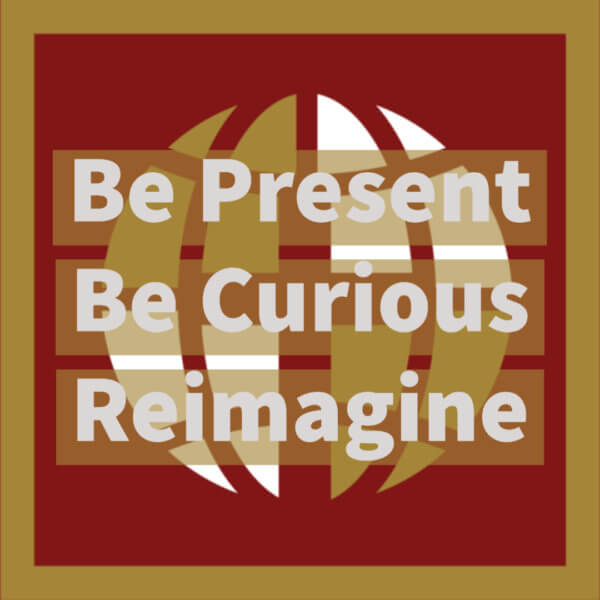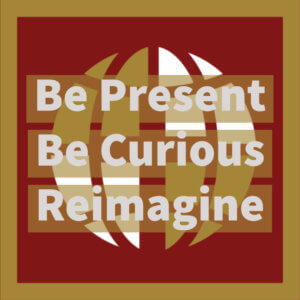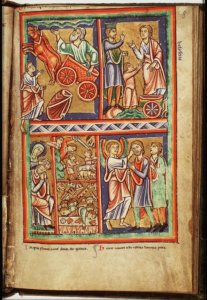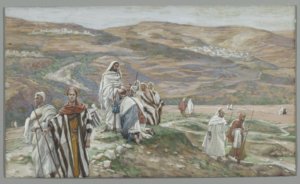
Be Present, Be Curious, Reimagine
 The Lambeth Conference of Bishops is coming up in three weeks, and all of us attending and helping to prepare for the conference are asked to cultivate three habits as we meet with others: Be Present, Be Curious, and Reimagine. I’ve been mentioning the Lambeth Conference a lot, I know, and some of you may have wondered — why is this Lambeth Conference important, and what does it have to do with me? If you’ll walk with me here, and Be Present, Be Curious, and Reimagine, I’ll share with you how preparing for the Lambeth Conference with Anglicans from all over the world — called Episcopalians in the United States — helps to see our own relationships more clearly, and also to hear scripture speaking to us in our context today.
The Lambeth Conference of Bishops is coming up in three weeks, and all of us attending and helping to prepare for the conference are asked to cultivate three habits as we meet with others: Be Present, Be Curious, and Reimagine. I’ve been mentioning the Lambeth Conference a lot, I know, and some of you may have wondered — why is this Lambeth Conference important, and what does it have to do with me? If you’ll walk with me here, and Be Present, Be Curious, and Reimagine, I’ll share with you how preparing for the Lambeth Conference with Anglicans from all over the world — called Episcopalians in the United States — helps to see our own relationships more clearly, and also to hear scripture speaking to us in our context today.
First, some background: the Archbishop of Canterbury has convened the Lambeth Conference every 10 years since 1867, but with the pandemic and other complications, this time it’s been 14 years. All currently serving bishops in the Anglican Communion — just under 1,000 in all — are invited. As of last week, 658 bishops and 480 bishops’ spouses were registered to attend — including our own Bishop Knisely and Karen. The bishops will explore what it means to be “God’s Church for God’s World” in each — and across all — of their unique contexts, reflecting on Christian unity and interfaith dialogue, evangelism, migration, the persecution of Christians, and the challenges presented by the climate crisis and a rapidly evolving tech-based global economy.
All these conversations will be grounded in Bible study, focusing on 1 Peter — a text that wrestles with themes of suffering, authority and power. What can we possibly have in common with people who live in places where the language and the money are different from ours, where day and night occur at a different time from when we experience it here in Newport, and where July and August are the Winter season? Where our clothing, our customs, our politics, our economies, and our foods are completely different?
Difference and Commonality
In my experience, when everything from the temperature of the air to the color of the dirt are different from ours, all the distractions we have around difference in our own context go quiet. When one person’s first language is Afrikaans, and another’s is Spanish, we stop seeing and hearing the little things we notice at home — whether someone has a Rhode Island, a Georgia, or a Boston accent. The “obviousness” of choosing which candidate to support in a local election. Difference based on whether we grew up in the Fifth Ward, in the Point, or in really remote and strange place like Northern New York near the Thousand Islands.
When we’re really different from each other in these visible, superficial ways, that’s when all the noise of difference stops — and we start seeing what we have in common: a search for meaning and purpose, a longing for peace, a deep need to be in community, love and concern for the safety of our families, and attachment to our way of life. When we’re the most different — strangely — we have the easiest time seeing how we’re alike. I’ve been the scribe for the drafting committee working on the Lambeth Reconciliation Call, one of the primary discussion points for the bishops at the Conference. We are an incredibly diverse working group from all over the world — two primates, three bishops, a cathedral dean, a 25-year-old development worker, two Lambeth Palace staffers, and me. We try through all of our conversations to be present, be curious, and reimagine how God’s Church in God’s World can be.
We’ve formed a community through our work — across borders, through languages, over time zones, and in different seasons of the year. Dean Michael of St. George’s Cathedral always puts on a sweater against the evening chill in Cape Town winter just as I’m feeling the mid-day summer heat here in Newport. We’re all kinds of different, yet we’re each made in the image of God. We have learned that our differences both challenge and deepen our experience of God in the other. We know that as we join in God’s mission of reconciliation, our differences are celebrated as we become whole in the body of Christ.
Relationships through Difference
Relationships through difference are holy and complex. And we’re all participants in systems that cast each of us in different roles in different contexts, creating division, disagreement, and conflict both among us and within us. And yet even with all of our differences, we need reconciliation and connection to each other, not just because we need community, but also because our very differences complete us as a body of Christ. Only in our diversity can we fully reflect the image of God. If this is true across cultures and time zones, economies, and colors of skin, imagine how very true it is here in Newport. Unity is not built through unanimity. We are different, and we’re not going to see — or say — the same thing in the same way. When we really listen to, and are curious about, each other’s lived experiences, we can reimagine our own views and experiences.
 In this morning’s reading from 2 Kings, the mighty warrior Naaman learns to be present, be curious, and reimagine his reality when his leprosy is cured — not through power, his own strength, wealth, or anything from home he was proud of, but through the advice of a young girl his army captured, and a dip in a lazy section of the Jordan River in a nation he’d bested in war.
In this morning’s reading from 2 Kings, the mighty warrior Naaman learns to be present, be curious, and reimagine his reality when his leprosy is cured — not through power, his own strength, wealth, or anything from home he was proud of, but through the advice of a young girl his army captured, and a dip in a lazy section of the Jordan River in a nation he’d bested in war.
In this morning’s gospel, Jesus specifically instructs the 70 he sends out to help with the harvest to be present, be curious, and reimagine as he commissions them for ministry. Carry no purse, no bag, and no sandals; Jesus says. Don’t bring your own currency, extra clothes, or any other habits or attitudes from home. Greet each household in peace, and be fully present if they are receptive to you. If they are not fully present, move on to the next household who can be fully present with you. Be curious. Stay with them, getting to know them and their ways, eating and drinking whatever they put in front of you — not the food you love from home. And together reimagine God’s world.
Naaman almost misses being healed because he’s suspicious and status conscious, but then he gets over himself, and everything is different. Despite Naaman’s reluctance, Elisha’s peace settles upon him, and both his understanding and his skin are healed and made new. Far from shaking the dust from his feet as he returns to his home kingdom, he packs his chariot full of dirt from the side of the River Jordan so that he can worship that holy ground at home.
 And the seventy returned to Jesus joyous, after the practices of presence, curiosity, and re-imagination gave them yielded success. Lord, in your name even the demons submit to us! they report. Jesus reminds the 70 that healing is not about power and authority, but about connection and understanding: Rejoice not that the spirits submit to you, but rejoice that your names are written in heaven. The kingdom of God has drawn near. Amen
And the seventy returned to Jesus joyous, after the practices of presence, curiosity, and re-imagination gave them yielded success. Lord, in your name even the demons submit to us! they report. Jesus reminds the 70 that healing is not about power and authority, but about connection and understanding: Rejoice not that the spirits submit to you, but rejoice that your names are written in heaven. The kingdom of God has drawn near. Amen
